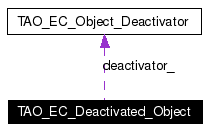
#include <EC_Lifetime_Utils.h>
Inheritance diagram for TAO_EC_Deactivated_Object:


Public Member Functions | |
| void | set_deactivator (TAO_EC_Object_Deactivator &deactivator) |
Protected Member Functions | |
| TAO_EC_Deactivated_Object (void) | |
| ~TAO_EC_Deactivated_Object (void) | |
Protected Attributes | |
| TAO_EC_Object_Deactivator | deactivator_ |
| Utility for deactivating ourselves from POA. | |
Maintains state necessary to deactivate object inheriting from this class from POA. The state can be set using set_deactivator() method. Then, the object can deactivate itself by doing this->deactivator_.deactivate ()
NOTE: deactivation does NOT happen automatically, and must be explicitly initiated as described above.
Definition at line 121 of file EC_Lifetime_Utils.h.
|
|
Definition at line 93 of file EC_Lifetime_Utils.i.
00094 : deactivator_ () 00095 { 00096 } |
|
|
Definition at line 99 of file EC_Lifetime_Utils.i. References deactivator_, and TAO_EC_Object_Deactivator::disallow_deactivation().
00100 {
00101 // Prevent automatic deactivation in deactivator's destructor.
00102 this->deactivator_.disallow_deactivation ();
00103 }
|
|
|
Set deactivation state to that specified by the deactivator argument. Definition at line 106 of file EC_Lifetime_Utils.i. References deactivator_, and TAO_EC_Object_Deactivator::set_values(). Referenced by TAO_ECG_UDP_Sender::new_connect(), and TAO_ECG_UDP_Receiver::new_connect().
00108 {
00109 this->deactivator_.set_values (deactivator);
00110 }
|
|
|
Utility for deactivating ourselves from POA.
Definition at line 135 of file EC_Lifetime_Utils.h. Referenced by set_deactivator(), and ~TAO_EC_Deactivated_Object(). |
 1.3.6
1.3.6